Obituary - Corby's first Alderman George Crawley, who always put deeds before words
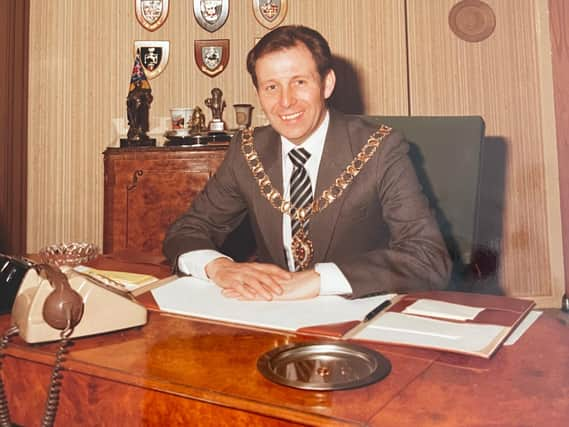

"Mum used to bring babies home and she'd pull the drawer out, you know, and we'd ask her 'who's baby is that?' and she'd say 'it's none of your business. We'll look after the baby until its mum's well enough to look after it again'."
It was perhaps the unquestioning generosity of George Crawley's mother Sadie, who took Corby' s babies in-need into her own home, that helped sow the seeds of his unwavering social conscience and straight-down-the-line politics that saw George become the leader, vice-chair and chair of Corby Council, the borough mayor, and ultimately our town's first Alderman.
Advertisement
Hide AdAdvertisement
Hide AdSpeaking of their own childhood, his sister Mary McArdie told the Northants Telegraph that the lessons they learned from their own mother Sadie and father, also called George, about taking care of others ran through her brother's public and private whole life.
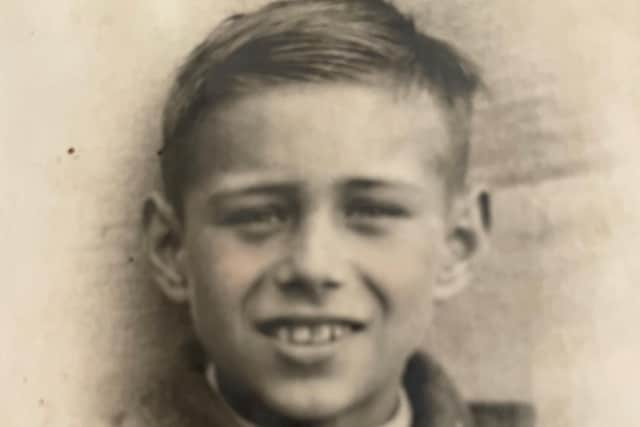

George, who died at home on July 24 aged 84, was a strong union voice in the steelworks and took on an unparalleled number of community roles to help improve his beloved Corby. His peerless dedication to the town is testament to a place where helping others, even if it means giving away your last penny, is built into its fabric.
A letter in 1942 from his maternal grandad John Hammill, who had already settled in Corby, to say that a five-year-old George's grandmother was dying brought the young family down from Coatbridge near Glasgow.
The first Stewarts and Lloyds blast furnace had been lit eight years before. Like so many that came before and after them, so drawn were the family to Corby's newly-built estates, wide open spaces and plentiful jobs that they decided to stay here.
Advertisement
Hide AdAdvertisement
Hide AdGeorge attended Samuel Lloyds school and developed a love of acting. His daughter Teresa Watson said: "He was often the lead actor in the school plays and won prizes for drama. They said he should go into acting. But he always said that really helped him with his public speaking which was such an asset to him."
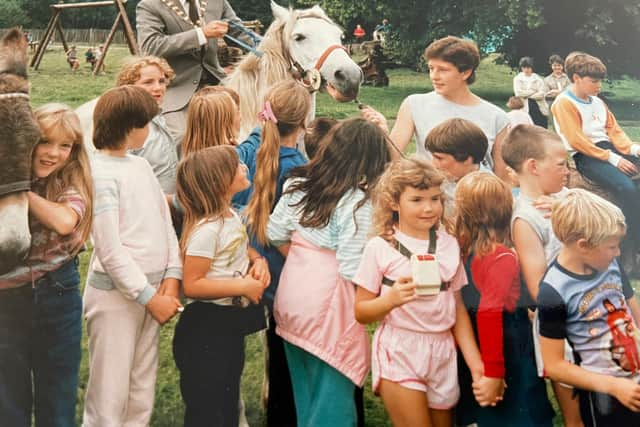

When his mum was widowed in her 20s he took on the role of man of the house. "He was my mother's pride and joy," Mary said.
As a young boy he was a butcher's boy and then George went into the steelworks aged just 16 to complete an apprenticeship as a pipe-fitter. Aged 17 he met Grace, then 16, who would later become his wife. But aged 21 he joined the army and was posted to Germany.
Teresa said: "He was very nervous but he met all the Scottish lads and thought he would get into the same barracks as them.
Advertisement
Hide AdAdvertisement
Hide Ad"Well, he was last in the line and there were no beds left so they said 'Crawley, you're needed over here', and he ended up as the chauffer for all the wives of the top brass. He had better living conditions and was treated well and he always said that even if you think things have not turned out how you wanted them to, it could always be a good opportunity."
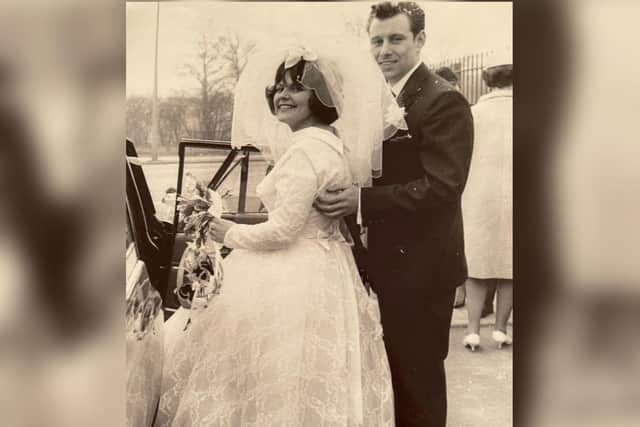

Two years later George returned to Corby and then, after eight years courting Grace, the pair married and moved into a house in Thames Walk where they would go on to spend their entire lives.
They had four children, Teresa, George, Susie and Charles and later two grandchildren and five great grandchildren.
During his time in the works George became a shop steward and fought for compensation for many steelworkers who had developed mesothelioma, an industrial disease caused by exposure to asbestos. In later life he went on to develop pleural plaques which contributed to his own death.
Advertisement
Hide AdAdvertisement
Hide AdHe also put on pantomimes in the works, making sure there was a box of chocolates under each seat for all the mums. He ran the works social clubs with his pal Jimmy Dickinson, and was involved in S&L Football Club.
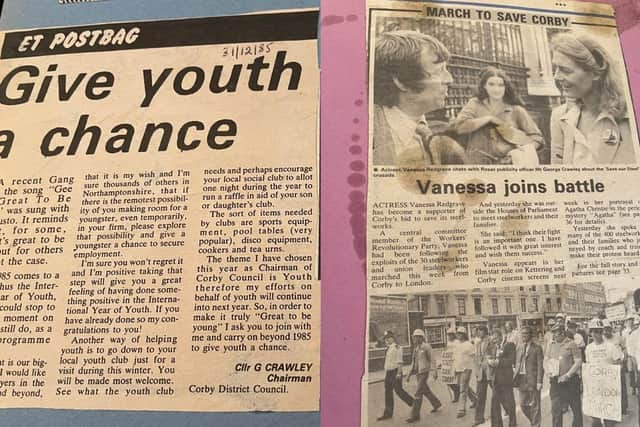

George became a councillor in 1979, just as the works were closing and Corby's future looked bleak. But he made it his mission to look after the youth of the town and vowed to ensure every young person had a job.
1985 was the International Year of the Youth and by this time George was Chairman of Corby Council.
"He worked really hard to persuade the employers to give young people a chance," said Teresa.
Advertisement
Hide AdAdvertisement
Hide Ad"He wrote to the ET asking them to give a young person a job and telling them that they wouldn't regret it. He knew that they were the future of the town and how important it was that they had a job to go to."
One of George's favourite moments was meeting the actress and political activist Vanessa Redgrave. In 1979 Ms Redgrave met steelworkers who had spent a week walking in a protest march from Corby to the Houses of Parliament. She also came to Corby to lend her support to the campaign against the closure of the steelworks where George bumped into her in a chip shop.
How proud he must have been to break the ground when Asda was later built on the site of the demolished blast furnaces that had drawn his family down to Corby.
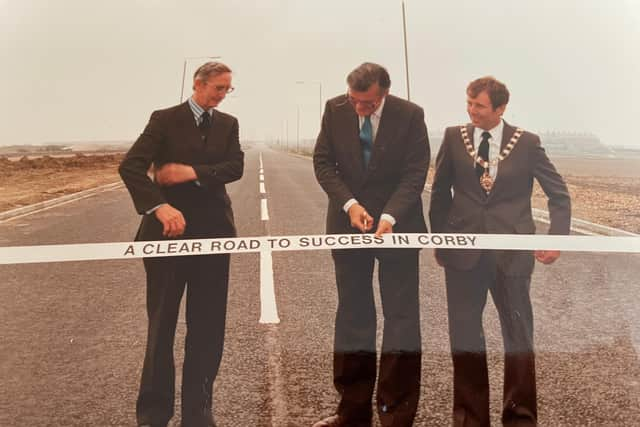

As a councillor, George stood firmly against the breakaway group of expelled Labour members that divided Corby Council in 1995. During the post-steelworks gold rush in the town, during which firms moved en masse to Corby lured in by European Grants and Enterprise Zone money, allegations of corruption and sleaze among council leaders began to emerge.
Advertisement
Hide AdAdvertisement
Hide AdExotic trips to lure in businesses were regularly taking place, and leader Kelvin Glendenning had had a glamorous stop-over, with dinner, at the Park Lane Hilton ahead of an interview with the Hungarian Embassy. District auditors had raised serious concerns about the expenses being claimed by the leadership - which in one year were larger than all the other districts in Northamptonshire.
Next came a row over the leader's plans to twin Corby with Shijiazhuang in China not long after the Tiananmen Square massacre.
There was the former Woodsman's cottage in Thoroughsale Woods, that just happened to be freshly renovated and vacant when Cllr Glendenning scandalously reached the top of the council housing list.
And then there were the infamous lavish lock-ins after council meetings were councillors were treated to food and drink courtesy of the Corby taxpayer.
"He opposed all of that," said Teresa.
Advertisement
Hide AdAdvertisement
Hide Ad"When he was chairman he once took the key home for the doors because he said he wasn't having them drinking away the taxpayers' money. They were ringing him up asking where the keys were."
Then came Corby First Labour. Unable to deal with the allegations of corruption from their own members, a group of Labour councillors with Glendenning at their helm broke away from their party to form Corby First. Their number included stalwarts who'd run the council for years, with agent Mick Skelton describing the remaining Labour members in the national press as 'communists and militants'.
Corby First vowed to win control of the council at the 1995 local elections.
It did not come to pass.
So hulking was their demolition that not a single Corby First member won a seat, with Labour candidates including George, his friends Esther Donald, and Jack Adamson winning more than a thousand votes each compared to Glendenning's 274, ending his political career.
Advertisement
Hide AdAdvertisement
Hide AdIt was a new start for Corby. George's niece Louisa Lloyd said: "It was like Derek Hatton and then some. It must have been difficult but Uncle George always stood up for what was right."
In 2003, George was made Corby's first Alderman, an honour bestowed on those who have provided 'eminent service' to the council.
Despite his devotion to public life, George always had time for every member of his family.
Louisa said: "No matter what age we were, what we were doing, he knew where every one of us was and always wanted to know how we were getting on."
Advertisement
Hide AdAdvertisement
Hide AdMary added: "He always wanted to make you feel good. He knew how important self-esteem was. Even in his dying days he was so kind."
Mary spent her working life in social services looking after youngsters in need. She said: "He said to me, why don't you bring them up to the Civic?
"He let them try on the chains and sit in the chair and gave them tea. These were kids who had spent their lives in care and he made them feel so important."
Teresa said: "When the ice cream man came round he used get all the kids in the street and buy them ice cream. People didn't have any money then.
Advertisement
Hide AdAdvertisement
Hide Ad"The phone was constantly ringing with people who needed help."
Despite his wife Grace's disability and her need for a wheelchair, George took his family on trips abroad, to places including America and Brazil.
"We even went up to Christ the Redeemer," said Mary. "And if we went anywhere, Grace came with us."
Teresa said: "He took my mum on the Jumbulance to Lourdes a couple of years ago and the nurse was quite worried about making sure he had oxygen because of his lungs but he ended up singing Climb Every Mountain as they were going up the Pyrenees."
Advertisement
Hide AdAdvertisement
Hide AdThe extended family also loved their annual trip to the Epsom Derby. "It was like The Broons day out," said Mary.
A committed Catholic, George once stood up at Mass to challenge the Canon who was delivering a homily about how wrong the miners were to strike.
"He got up and told him 'you're wrong, the miners are desperate'," said Teresa.
And when George himself went on strike for 13 weeks, it was his own mother who brought food packages and made sure the children were fed.
Advertisement
Hide AdAdvertisement
Hide AdGeorge was also part of the trust at Brooke Weston, which was one of the first City Technology Colleges in the country. He was also a non-executive director at Kettering General Hospital and at one point stood in for the hospital's chief executive while Teresa was working there as a nurse, making him, for a brief period, her boss.
He retired from the steelworks after 40 years aged 55 to look after his adored wife Grace, who survives him. They went into Glenmoor Care Home together but Teresa brought them home six weeks ago so George could die at home, surrounded by his family.
"It was just so lovely to have that extra time together," said Louisa, "and for him to tell us all his stories. You can't replace that."
Councillor Mark Pengelly, whose aunt Elizabeth was George's sister, won his council seat for the first time at the notorious 1995 elections, said that George's family always had an open-door policy for whoever needed it.
Advertisement
Hide AdAdvertisement
Hide AdHe said: "George was one of the leading figures in the 1995 elections when the Labour group fought off Corby First.
"He did so much for youth employment and for getting those kids into work.
"It was the first thing on every agenda.
"He was a truly great person."
George's funeral will take place on Wednesday, August 11 at 10am at Our Lady of Walsingham RC Church in Occupation Road. The family is asking for donations to Corby Foodbank instead of flowers.